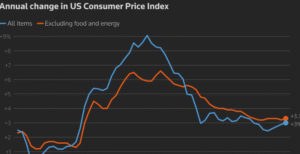$SPX $NIKKEI $WTI
#StockMarket #Inflation #FederalReserve #JapanStocks #EuropeanMarkets #OilPrices #InterestRates #Economy #Investing #USMarkets #Earnings #GlobalMarkets
US markets ended the session mixed as investors weighed fresh inflation data and its implications for Federal Reserve interest rate policy. While corporate earnings reports have largely met expectations, the latest economic data suggests inflation remains stubbornly high, prompting concerns that the Fed could delay anticipated rate cuts. The S&P 500 ($SPX) closed slightly lower, consolidating after recent gains, while the Nasdaq saw minor losses led by weakness in tech stocks. Bond yields remained elevated, with the 10-year Treasury yield holding near recent highs, reflecting uncertainty over the central bank’s potential policy moves. Meanwhile, investors are closely monitoring the impact of persistent inflationary pressures on consumer spending and corporate profit margins.
Asian markets presented a mixed picture, with Japan’s Nikkei 225 ($NIKKEI) extending its rally, buoyed by a weaker yen and robust earnings results from major firms. Strong corporate outlooks in Japan supported broader risk sentiment, offsetting some apprehensions surrounding global monetary policy. However, Chinese stocks struggled to maintain upward momentum as concerns lingered over weak domestic demand and ongoing regulatory uncertainty. Investors remained cautious in Hong Kong and Shanghai, with many awaiting further policy support measures from Beijing to stabilize growth. The divergence in Asian markets highlights the varying economic trajectories across the region as investors react to different domestic and global fundamentals.
In Europe, major indices touched fresh highs, driven by strong corporate earnings and positive economic data. Investors reacted favorably to a slew of upbeat results from key sectors, with banking stocks posting gains amid expectations of stable interest rates. The pan-European Stoxx 600 index recorded moderate gains, with Germany’s DAX and France’s CAC 40 leading the charge. Optimism over corporate profits overshadowed broader macroeconomic concerns, despite ongoing geopolitical tensions in Eastern Europe. Markets were buoyed by hopes that Russia-Ukraine peace talks could de-escalate geopolitical risks, further supporting investor sentiment. The current risk-on mood in Europe suggests that investors are prioritizing microeconomic factors, such as earnings performance and sectoral strength, over macro uncertainties.
Oil prices edged lower, reflecting cautious optimism surrounding diplomatic efforts to ease tensions between Russia and Ukraine. West Texas Intermediate ($WTI) crude slipped as supply concerns eased somewhat, with traders factoring in the possibility of reduced geopolitical risk premiums. While energy markets remain sensitive to geopolitical developments, broader sentiment on oil is also shaped by demand-side dynamics, particularly in China. Weaker economic growth projections for China have contributed to volatility in commodities, keeping energy traders on edge. Additionally, expectations that central banks may keep monetary policy restrictive for longer have influenced oil price movements, as tighter financial conditions can dampen demand. Moving forward, energy markets are likely to be influenced by a combination of geopolitical factors, inventory reports, and signals from major oil-producing nations.










Comments are closed.